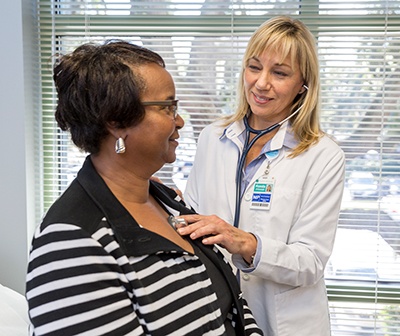Advanced Practice Providers
January 1, 2021By: Kurt Gambla, D.O., board-certified internist and chief medical officer at Beaufort Memorial Hospital
Categories: Primary Care

Got a minor medical issue you need treated? You may find it easier to schedule an appointment with a physician assistant or nurse practitioner than your family doctor.
Busy primary care and specialist practices are increasingly turning to these advanced practice providers to help meet the growing demand for health care services. And patients couldn’t be happier.
You can typically get in to see a nurse practitioner (N.P.) or physician assistant (P.A.) faster than you can a doctor. More important, these highly trained professionals can provide just the care you need to get you back on the road to good health.
N.P.s and P.A.s can diagnose and treat common medical problems, order and interpret imaging tests and lab work, prescribe medication, refer patients to specialists and manage chronic health issues like diabetes, high blood pressure and asthma.
Of course, patients who prefer to see a physician can always make an appointment with a doctor. But even if they choose to go with an N.P. or P.A., they can rest assured they are being treated under the supervision of a physician. Should the need arise, their N.P. or P.A. can call in the doctor for a consultation.
Recognizing the critical role N.P.s and P.A.s can play in today’s health care system, Beaufort Memorial Hospital has hired a number of advanced practice providers for its primary care practices. They’re also being used to assist doctors in specialties like gastroenterology, vascular and general surgery, orthopedics, and obstetrics and gynecology.
So what’s the difference between an N.P. and a P.A.? They both have a very similar scope of practice, but they take different educational tracks to become certified in advanced care.
N.P.s attend nursing school and follow a patient-centered model that focuses on disease prevention and health education. P.A.s go through a physician assistant program, which follows a disease-centered model, focusing on the biologic and pathologic components of health.
Both are required to earn a minimum of a master’s degree, complete extensive clinical hours working with patients and pass a rigorous medical exam to earn certification.
The explosive growth of these health care professionals has come as medical practices discover the benefits of having them as part of the health care team. In addition to offering patients with routine complaints quicker access to treatment, N.P.s and P.A.s free up physicians to spend more time on complex cases.
According to a study released by the Association of American Medical Colleges, the U.S. is already facing a scarcity of physicians. By 2030, we could find ourselves short as many as 150,000 doctors in both primary and specialty care.
To help fill the gap between providers and demand for services, Beaufort Memorial has taken a number of steps to ensure it can continue to offer the community access to high-quality health care right here at home. Nurse practitioners and physician assistants are a key component of those initiatives.
By working together, we can provide patients with the care they need when they need it.
By Kurt Gambla, D.O., board-certified internist and chief medical officer at Beaufort Memorial Hospital
